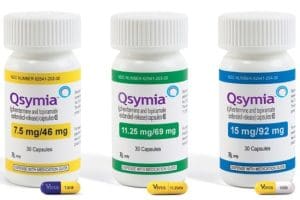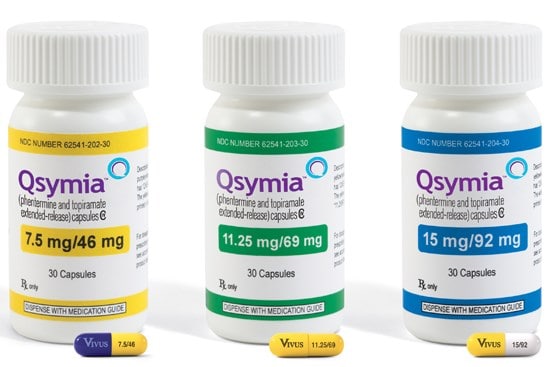 Qsymia is a prescription fat burner that has been used by over a half a million patients and delivered clinically proven results. While it may work for people, we often find prescription drugs to be riddled with negative side effects that make losing weight a very uncomfortable and even more of a struggle. Read this Qsymia review to find out why it did NOT rank on our list of the top 10 Best Natural Fat Burners.
Qsymia is a prescription fat burner that has been used by over a half a million patients and delivered clinically proven results. While it may work for people, we often find prescription drugs to be riddled with negative side effects that make losing weight a very uncomfortable and even more of a struggle. Read this Qsymia review to find out why it did NOT rank on our list of the top 10 Best Natural Fat Burners.
Qsymia Side Effects
Because Qsymia is a prescription drug, the potential for side-effects, some of which may be serious, exists. Please make sure you ask your doctor about Qsymia side-effects before taking this medication.
The Benefits Of Qsymia
The following are claimed benefits of taking Qsymia
- Increased weight loss
- Reduced cravings and appetite
- Boost in energy levels and motivation to exercise
What Is Qsymia?
Qsymia is one of the many fat burning solutions available for people who need to lose weight, and are struggling with doing it on their own. There are certain criteria that you need to meet before you can take Qsymia. First of all, you must have a BMI of over 30, and be experiencing at least one weight-related medical condition.
Qsymia makes the claim that you should be able to lose 15-19 pounds and shed 2-3 inches off your waist in the first 3 months, 22-29 pounds and 3-4 inches in the first 7 months, and 23-32 pounds and 4-5 inches in a year. These results are pretty underwhelming for taking a prescription drug and having to experience the side effects that come along with that.
How Does Qsymia Work?
Qsymia is made up of two fat burning prescription drugs known as Phentermine and Topiramate. These two drugs work together to help reduce your appetite, eliminate your cravings, make you feel fuller, and increase your energy levels. The way they do this is by stimulating your central nervous system into releasing specific hormones and neurotransmitters that are responsible for increasing your energy levels and making you feel fuller.
The two neurotransmitters responsible for helping make you feel full are dopamine and serotonin. These chemicals are naturally released when you feel satisfied after a good meal, so these drugs are pretty much tricking your brain into thinking that you just ate.
The other neurotransmitters responsible for reducing your appetite and cravings are known as adrenaline and norepinephrine. These two neurotransmitters do this by activating your brain’s fight or flight mechanism.
By doing this, blood starts to rush to other areas besides your digestive system, making you absorb food less quickly. This helps reduce cravings and your chances for unnecessary snacking.
Additionally, norepinephrine and adrenaline also work to increase your energy levels. This can help motivate you to get up and moving, allowing you to burn more calories on a daily basis.
Qsymia Reviews From Real Customers
So it turns out only 1/3rd of users actually think Qsymia is a 10/10. That’s a pretty iffy number considering it’s a prescription drug with many side effects. A lot of people experienced some serious side effects, which is why they had to rate it so low.
One user claims it caused him to have short-term memory loss, even making him forget the name of his kids for a minute. Other people don’t like how expensive it is, even though it did prove to work for them.
The Pros
- Works for some people
- Helps motivate you to workout
- Places you in a long-term behavioral changing plan
The Cons
- Serious side-effects
- Some people didn’t notice that many benefits
- The results they claim are underwhelming
Qsymia Conclusion
Qsymia is an example of a prescription drug for weight loss that might do more harm than good. Some of the side effects people experience make this drug seem like it might not be worth the potential benefits, especially when there are so many other options on the market. For the safest and most effective ways to lose weight, check out our list of the top 10 options on our Fat Burners page.
I’m not just a supplement analyst. I’m an extremely qualified one! I am a Certified Nutrition Coach (CNC) and actually received my certification directly from the National Academy of Sports Medicine. I am also a Nutrition & Wellness Consultant, certified by the American Fitness Professionals Association (AFPA).



